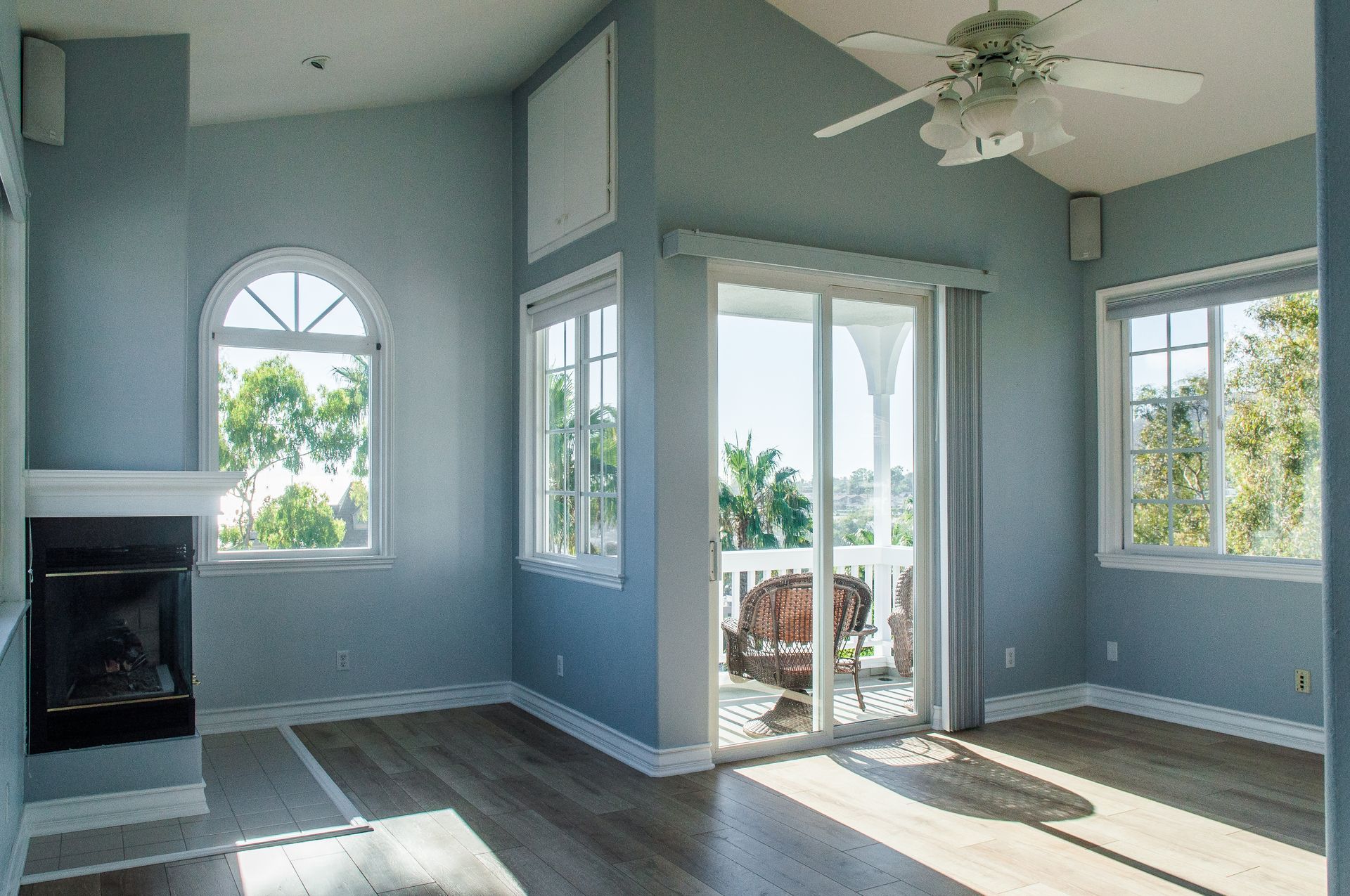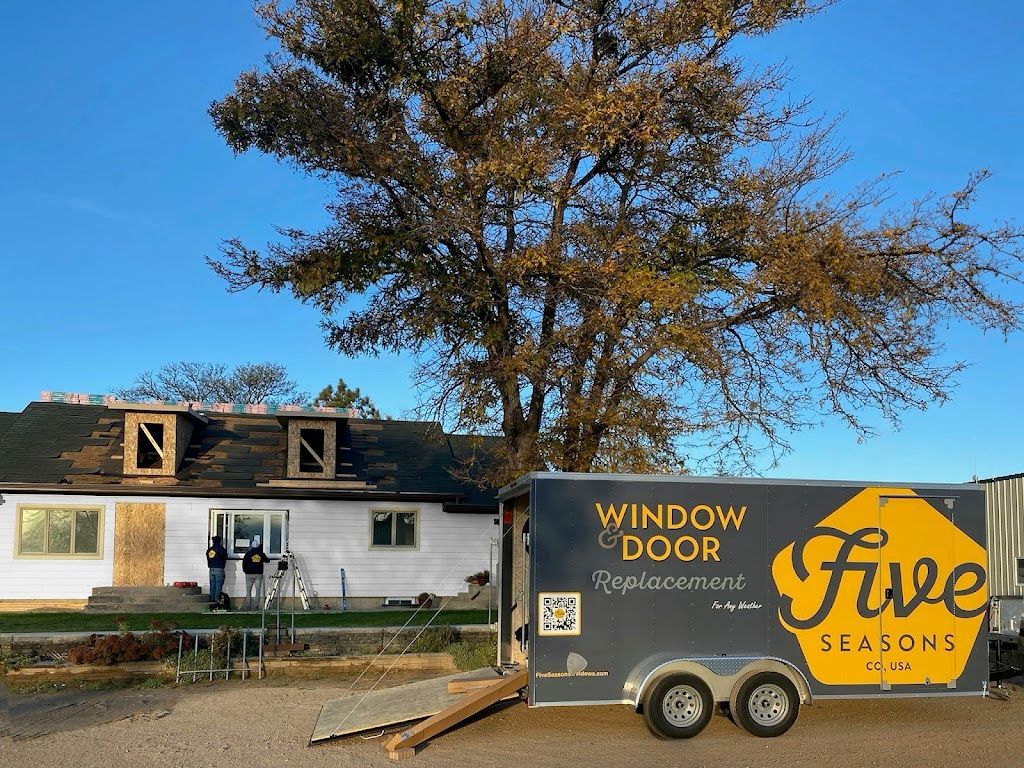Most patio doors in Colorado need to be replaced after 15 to 30 years, depending on frame material, exposure, and maintenance. Signs of failure include fogging between glass panes, air leaks, difficulty operating the door, and visible frame warping. In high-altitude areas like Colorado Springs, elevation stress and UV exposure can accelerate wear and shorten lifespan. According to the U.S. Department of Energy, older patio doors with worn seals or single-pane glass can contribute significantly to home heat loss, especially in extreme climates.
Patio doors are more than just entryways—they’re integral to your home’s energy efficiency, security, and seasonal comfort. In Colorado, where high elevation, dry air, and strong sun exposure all play a role, patio doors endure more stress than most homeowners realize. Knowing when to replace them is essential for maintaining indoor comfort and controlling utility costs.
This guide will help you recognize the signs of door failure, pick the right time to act, and choose patio doors suited for Colorado’s unique climate.
Why Patio Doors Matter in Colorado’s Climate
Living in Colorado means your home experiences wide daily temperature swings, intense UV exposure, and frequent freeze-thaw cycles. These conditions are hard on patio doors—especially older models. Over time, even small weaknesses in the door’s frame or seal can lead to drafts, heat loss, and structural deterioration.
The glass and frame materials must perform under pressure—literally. At higher elevations, poorly insulated glass can lose its fill or experience seal failure more quickly. UV rays also break down frame materials faster at altitude, causing fading, brittleness, and warping. And with modern patio doors spanning large openings, they have a significant effect on heating and cooling efficiency throughout the year.

Common Signs It’s Time to Replace Your Patio Doors
In areas like Monument or Evergreen, homeowners often report persistent drafts and glass fogging earlier than expected—typically due to elevation-related pressure changes and extreme UV exposure. These are key signals that your patio door may be underperforming.
It’s not always obvious when a patio door is failing, but several warning signs tend to show up with use. Drafts, difficulty sliding or locking, foggy glass, water intrusion near the frame, and visibly warped materials are all red flags. If your energy bills are rising and your door is over 15 years old, these issues are more than cosmetic—they’re signs of deeper inefficiency.
Ideal Timing for Patio Door Replacement
Colorado’s seasonal extremes make certain times of the year better for door replacement. Spring and early fall are ideal—temperatures are mild, and installers are less likely to encounter weather-related delays. Replacing doors before winter helps prevent heat loss and cold drafts, while a summer upgrade can improve interior cooling efficiency.
Additionally, if you're ordering custom doors or energy-efficient upgrades, be aware that manufacturing and delivery timelines can take several weeks. Planning ahead ensures you're not stuck with a failing door during a high-demand season.
How Long Do Patio Doors Last in Colorado?
The average lifespan of a patio door depends on its material and how well it’s maintained. In general:
●
Vinyl doors: 20 to 30 years
●
Wood doors: 15 to 25 years with regular upkeep
●
Fiberglass doors: 25 to 40 years, best for dry climates
●
Aluminum doors: 15 to 20 years, less insulative
Colorado’s intense sun and freeze-thaw cycles can shorten these ranges without proper maintenance or weather protection.
How Elevation Impacts Patio Door Performance
Colorado’s high elevation means lower air pressure, which puts added strain on insulated glass units (IGUs). When patio doors aren’t rated for altitude, the gas fill between panes can expand or contract more aggressively, leading to seal failure or distortion. This is especially common in areas above 6,000 feet, such as Woodland Park or Estes Park. Choosing patio doors that are specifically manufactured or adjusted for elevation helps maintain insulation integrity over time.
Should You Repair or Replace?
Some patio door issues can be fixed, but others signal the need for full replacement. Minor repairs—like adjusting hardware, replacing rollers, or reapplying weatherstripping—can help extend the life of a relatively new door. However, more serious problems like broken seals, persistent leaks, cracked glass, or warped frames usually mean the door is no longer performing as it should.
Repair vs. Replace Quick Reference
| Condition | Recommended Action |
|---|---|
| Loose handle or misaligned lock | Repair |
| Cracked single glass pane | Repair (if isolated) |
| Persistent drafts or water leaks | Replace |
| Foggy or failed insulated glass | Replace |
| Frame warping or sticking door | Replace |
Choosing the Right Replacement Patio Door
When it’s time to replace your patio door, you’ll have several options to consider. Sliding doors are popular for their space-saving design and modern aesthetic, while French doors offer a classic, wide-opening feel. For homes with large openings or scenic views, multi-panel or folding doors create a seamless indoor-outdoor transition.
Material choice also matters. Vinyl frames are affordable and require minimal upkeep. Fiberglass performs well in Colorado’s climate thanks to its resistance to warping and thermal expansion. Wood-clad doors deliver elegance and insulation but need regular care to stay weather-resistant.
Energy-efficient glass is essential—look for Low-E coatings, argon or krypton gas fills, and at least double-pane construction. Tempered or laminated safety glass adds peace of mind and can reduce UV damage to interior furnishings.
➡️ Preparing to upgrade other exterior doors too? Read our guide on Entry Door Installation in Colorado Springs: What Homeowners Need to Know for tips on materials, timing, and weather-resilient choices.
People Also Ask About Patio Door Replacement in Colorado
How do I know if my patio doors are leaking air?
Air leaks around patio doors often present as cold drafts during winter or uneven temperatures near the opening. You may also feel warm air rushing in during summer. A quick way to check is to hold a lit candle or stick of incense near the doorframe—if the flame flickers or the smoke shifts, there’s likely a draft. Over time, worn-out weatherstripping, warped frames, or shrinking seals can allow outdoor air to enter. If your energy bills are creeping up and you feel temperature shifts near the door, it's a strong sign your patio door isn’t sealing properly anymore.
Can I replace just the glass in my patio door?
In some cases, yes. If your patio door’s frame is in good shape and the issue is isolated to cracked or fogged glass, a glass-only replacement may be possible. This is typically more affordable and less disruptive than full replacement. However, if the door has other issues—such as poor insulation, sticking tracks, or damaged seals—a full door replacement is usually more cost-effective in the long run. Keep in mind that if your glass is part of a failed insulated glass unit (IGU), replacing the glass will require a matching energy-efficient component to maintain performance.
What’s the most energy-efficient patio door material for Colorado?
Fiberglass is widely considered the top-performing material for energy efficiency in Colorado’s dry, high-altitude climate. It resists warping and temperature-related expansion, while offering excellent insulation. High-end vinyl is also a strong option and tends to be more affordable. Wood-clad doors offer great insulation and visual appeal but require more upkeep. Regardless of material, the most important energy-saving feature is high-performance glass—ideally double- or triple-pane, filled with argon or krypton gas, and coated with Low-E to reflect heat and UV rays.
How much does it cost to replace patio doors in Colorado?
Costs vary depending on material, size, features, and whether structural changes are needed. On average:
● Standard vinyl sliding doors start at around
$1,200–$2,000 installed
● Fiberglass or wood-clad French doors range between
$2,500–$5,000
● Large custom multi-panel systems can exceed
$8,000
Labor costs may also be higher in mountain towns or during peak seasons. Upgrading to energy-efficient glass or adding features like built-in blinds will increase the price but can deliver longer-term savings on utility bills and home comfort.
Do I need a permit to replace my patio door in Colorado?
In most municipalities, replacing a patio door with one of the
same size and style does
not require a permit. However, if you’re making
structural changes—such as enlarging the opening, altering the load-bearing wall, or modifying egress—then a permit is usually required. Local requirements vary by county and city, so it's best to check with your building department or work with a licensed contractor who is familiar with your region’s code.
Our Take: When It’s Time, Don’t Wait
The longer you wait to replace a failing patio door, the more you risk—drafts, water intrusion, and higher utility costs are just the start. Patio doors are a key line of defense against Colorado’s wild weather. If your door is older or showing clear signs of wear, plan your upgrade during a temperate season and prioritize performance materials that suit high-altitude living.

Conclusion: Replace Smart, Live Better
A well-chosen patio door replacement adds more than beauty. It strengthens your home’s insulation, enhances everyday comfort, and protects against Colorado’s extreme elements. Acting before seasonal extremes take hold allows you to enjoy peace of mind, improved performance, and renewed curb appeal—year after year.
Get Started Today
Five Seasons Windows & Doors is Colorado’s top-rated local window company with 230+ 5-star reviews. We offer expert advice, no-pressure quotes, and flexible project options — including phased installs. Schedule your consult today.



